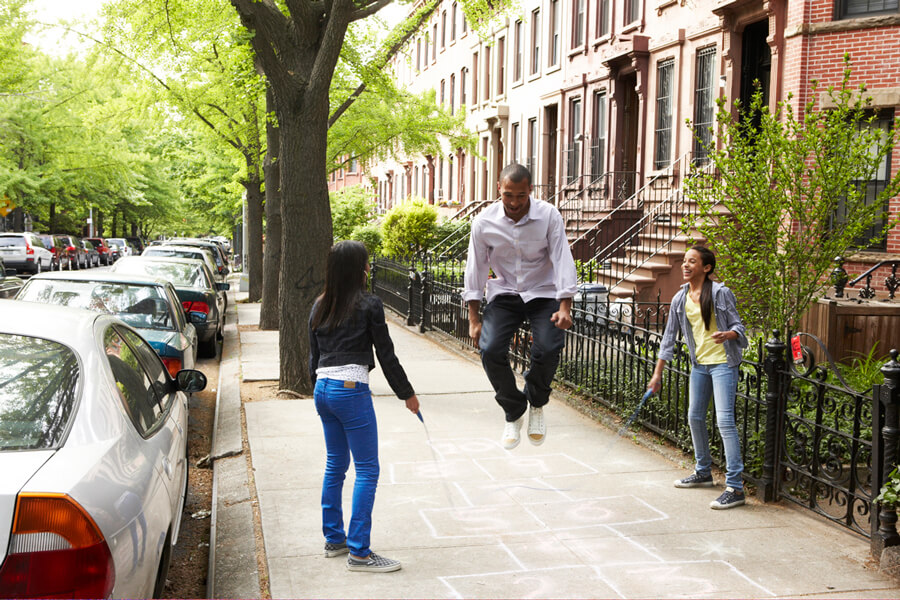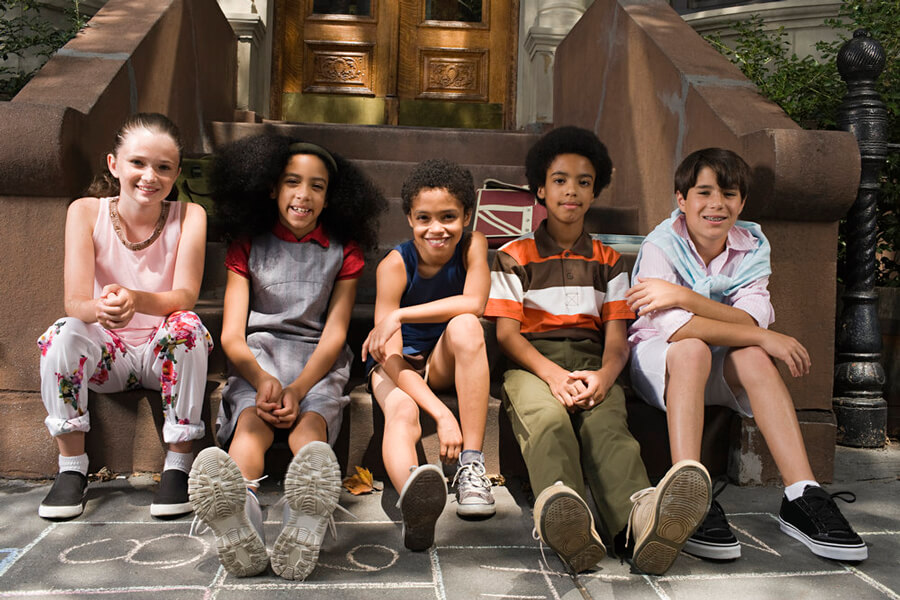7 Best Parenting Tools for Raising Teens in New York City
The ultimate resource guide for city parents.
 New York City can a teenager’s dream — and a parent’s nightmare. A massive playground with endless possibilities, and unforeseen hazards.
New York City can a teenager’s dream — and a parent’s nightmare. A massive playground with endless possibilities, and unforeseen hazards.
At my New York City Parenting Workshops, parents of teenagers inevitably appear the most stressed out. Who can blame them? Compare NYC to other US cities and you’ll unearth mind-blowing statistics:
NYC has:
- The largest school system (over 2K public & private high schools alone).
- The highest population density (27K people per sq. mile).
- The most subway stations in the world (nearly 500).
- 2 million New Yorkers under 18 yrs old (that’s a lot of youth!)
- Over 200 hundred languages spoken.
This means the average teen in NYC travels farther and faster in less time than a suburban teen can hitch a ride to Walmart. In a heartbeat, NYC teens are transported miles from home, deposited in different neighborhoods and communities, and left unsupervised, and too-often unequipped.
Talk to any parent of a teen who has gotten on the wrong subway and emerged in a strange new land. The panicky phone call home goes like this:
KID: Mom, I’m lost.
MOM: Where exactly are you?
KID: I don’t knowwwwwwww!
While NYC offers exciting opportunities for teens, it can be a nerve-wracking fiasco for parents. As a psychotherapist, speaker and author who has spent 25 years working with teens and their families in NYC, I am not advocating for helicopter parenting or questioning the free-range kid movement, I am campaigning for common sense.
The following checklist is a meant to guide and inspire discussion among NYC parents. Naturally, teens have unique temperaments and personalities, just as parents have different parenting styles and approaches. This best practices list covers all areas concerns for NYC parents and concludes with a list of NYC programs for teenagers.
The 7 Best Parenting Practices in New York City
1. Traveling in New York City
Unlike parents of elementary school-age children, who shepherd their little darlings door to door, parents of middle and high school students in New York City face a conundrum: how much independence we allow?
- Walk to school?
- Bus or subway?
- Travel alone, with friends or parent chaperone?
Start by hanging a neighborhood map in your kid’s room with important points clearly marked: home, school, friends’ apartments, etc. Next, add a New York City bus and subway map and review travel options. Let your kids take the lead. Try a few test runs in the neighborhood and focus on building your kid’s confidence and self-reliance.
Remember, anxiety is contagious. Be playful and light. You can also make us of the many MTA or NYC travel apps. If your kid has a smartphone (we’ll discuss that later) a tracker device can be a lifesaver if he or she gets lost.
2. Parenting Emergencies
Whether it’s lost house keys, power outages or schoolyard bullies, prep your kid with a “Problem/Solution” checklist for unforeseen events. For example:
- “I lost my house keys!” Leave an extra set with a friend, neighbor or your super.
- “I’m out of money!” A bank card helps your kid learn to budget or borrow in an emergency.
- “Someone is following me!” Don’t go home and risk being followed into the building, stop in a neighborhood store, the library or the police station and ask for help. Have an adult call your parents or a guardian.
For a complete list of emergency preparations to review with your family, take a moment and visit: NYC Emergency Management
3. School Involvement:
Hang your kids’ school schedule in a common area, include contact information for deans, teachers and guidance counselors. Visit the school’s parent portal, keep up on events. Attend PA meetings and parent-teacher conferences. If your kid is struggling academically, consider an evaluation for nonverbal learning disabilities (See “Three Signs Your Kid Has Learning Disabilities“). Accommodations such as extended time on tests, resource room support, tutoring lower academic stress and increase performance.
4. Youth Centers & Programs
If your school doesn’t have after-school programs, clubs or teams, check out your local youth center. Teens crave leadership, positive adult role models, and skills to build confidence and self-esteem. Playing on a sports team, learning an instrument, or developing artistic talent can make a big difference. A list of centers and programs is below.
5. Parties & Sleepovers
Avoid unsupervised parties or sleepovers. If you bend to your kid’s wishes and agree to a party or sleepover, supervise it yourself or contact the parents in charge. Better yet, meet the supervising parents in person when you drop off your kid.
Teens can be excellent manipulators and rarely consider the consequences of their choices. NYC parents have all heard stories of a teenager whose parents trusted him to be left home alone. After his parents leave, the teenagers put out invites on social media and suddenly dozens (sometimes hundreds) of teenagers to show up at your home. If the police are called, the owners of the home (yes, mom and dad) are responsible for all liabilities and can be arrested and charged.
6. Cell Phones
Basic cell phones can be a blessing for NYC parents. You can track your kid, call your kid. If there is an emergency, your kid can contact you or the police.
Smartphones, on the other hand, are quickly becoming the number one source of conflict in households. More and more research is emerging about the negative effect of smartphones on teenagers. Due to their addictive qualities and impact on behavior and emotional intelligence (See “How Technology Lowers Emotional Intelligence in Kids“), many schools and educators, even CEOs of tech companies, are banning them from their own children until the age of 16.
“Wait Until 8th” is a national movement to keep smartphones out of the hands of kids until 8th grade. Bottom line: there is no good reason for an NYC teen to carry around an $800+ pocket computer when a simple flip-phone will do. If you decide your kid needs a smartphone, be prepared to provide structure and limits (See “See 3 Mistakes Parents Make with Technology“)
7. Drugs and Alcohol
The opiate epidemic is now hitting NYC schools (See The Daily News) and prescription drug abuse among teens is rising at alarming rates. Yet too many parents remain clueless about their kid’s substance abuse. Teens in NYC have access to powerful and potentially dangerous drugs, such as Xanax or Adderall, for as little as $2 a pill.
If your family has a history of substance abuse, your kid is at high risk for addiction. Stay alert. Keep a dialogue going with your kids, add a drug test to their annual psychical. Be vigilant. You can’t be a good parent without making unpopular choices. Do whatever you can to keep your kid from wandering into the wrong crowd. If interventions fail, and your kid is in danger, do not hesitate to consider a boarding school (See “Boarding School Advice for Parents“).
3 Biggest Parenting Blunders
1. Too Much Freedom
Pushing limits is typical teen behavior. Out of frustration, parents give up or walk away, causing bad or dangerous behaviors to go unsupervised. Teens still need structure, limits, and boundaries. Unlimited internet, gaming, social media obsessions, lax curfews, ignoring drug or alcohol use is sure to set the stage for bigger problems in your kid’s future.
2. Not Knowing Your Teen’s Friends
Remember the old adage: “Show me your friends and I’ll show you your future.” Make an effort to get to know your kid’s friends. Encourage your teenager to invite them over. Host a get-to-together, sleepover or drive your kid and his or her friends to an event. Most parents can spot trouble when they see it. If you sense a friend is a negative influence, talk with your partner or school guidance counselor about possible interventions.
3. Losing Touch
When families drift apart and parents lose touch with their teens, they land in a higher risk category for negative outcomes. Hold weekly family meetings, plan family outings and vacations, if you sense your kid is struggling, spend more time with him or her. Stay in touch, strengthen your relationship; such small steps are the express lane to better children-parent communication. (If you think your teenager is depressed, see “Three Signs Your Teen Needs Therapy“)
The Best of the Best: Resources for Parents of Teens in New York City
There are plenty of programs for teens in NYC, here are the most outstanding programs that I’ve worked with. If you had great experiences with other teen programs, email me and I’ll add them to the list.
Teen Substance Abuse Programs:
Center for Living: (212) 712-8800 226 East 52nd Street, NY, NY 10022
Realization Center (212) 627-9600 19 Union Sq. West, NY, NY 10003
Teen Centers for Learning Diagnostics:
The Yellin Center (646) 775-6646 104 West 29 St, NY, NY 10001
Brooklyn Learning Center (718) 935-0400 142 Joralemon St, BK, NY 11201
Teen Gender & LGBTQ Support:
The Center (212) 620-7310 208 West 13 St, NY, NY 10011
Teen Counseling & Health Centers
The Door (212) 941-9090 121 6th Ave, NY, NY 10013
Mt. Sinai Adolescent Center (800) 637-4624 312 East 94 St, NY, NY 10128
Columbia Day Program (18+) (212) 305-6001 51 West 51, NY NY 10019
Teen Resources
Hotline: (800) LIFENET (800-543-3638)
Teen Resource NYC Web Site
Psychiatric Emergency Hospitalization
Bellevue Hospital Comprehensive Psychiatric Emergency Program (CPEP)
Teen Social Skills Groups:
Sean Grover, LCSW (212) 727-0488 41 East 11th Street, 4th floor


